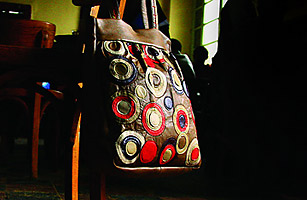
Taytu handbag
There's an old Ethiopian saying that "spiders' webs joined together can catch a lion." Taytu — the name comes from a legendarily strong-willed Ethiopian empress — is a company comprised of a group of small-scale leather and hand woven textile producers from in and around the capital, Addis Ababa, who are achieving together what they could never have dreamed of doing individually: they've established the first luxury label in one of the poorest countries on earth, a nation that is still reeling from the aftershocks of a protracted civil war. As for the lion they have caught? Make it lions, because Barneys New York and Fred Segal in Santa Monica, Calif., are among Taytu's growing and loyal customer base.
Taytu, which receives long-term support from the NGOs USAID (United States Agency for International Development) and UNIDO (United Nations Industrial Development Organization), began five years ago with the idea that fashion buyers in developed nations would buy Ethiopian luxury products — in this case ornate leather handbags and beautiful one-off scarves — if the goods were sophisticated, in tune with trend and yet also authentic, and well-made in the traditional ways of this ancient African civilization.
Creative support came in the form of a few designers and fashion technicians, including Italians Ambrogio "Gina" Malinverni (who trained the craftsman in their own factories and workshops) and Barbara Guarducci (who has since taken the helm a design collective in Bangladesh), as well as American Holly Hikido, who also liaises with design consultants who have worked with the likes of Missoni and Fendi.
At last, Taytu opened a tiny store — surely conspicuous in chaotic Addis Ababa — where handbags and scarves are displayed on old coffee-grinding tables against a backdrop hand-painted with bright pink flowers. But potentially, Taytu-produced goods could increasingly turn up in far swankier locales. The 250 or so Ethiopians now earning a living thanks to the company are also manufacturing small trial runs for some of fashion's top names, which remain confidential for now as the designers in Paris, Milan and New York gauge whether Taytu can meet the exacting standards of international fashion production. Model-turned-humanitarian Liya Kebede, who has her own children's wear line, lemlem, that is produced out of her native Ethiopia, already uses Taytu as one of her resources.
"Working in Addis is exciting and challenging" says Hikido, who laughs when she recalls that the first time she asked for a courier, a man on a donkey turned up. "But the package made the flight and we got an order from Paris," she adds. The aim is for Taytu to expand in a way that is both ethical and ecologically sound, while those involved acquire the technical know-how, business skills and, just as important, fashion contacts to make this web of little businesses self-sustaining and strong.